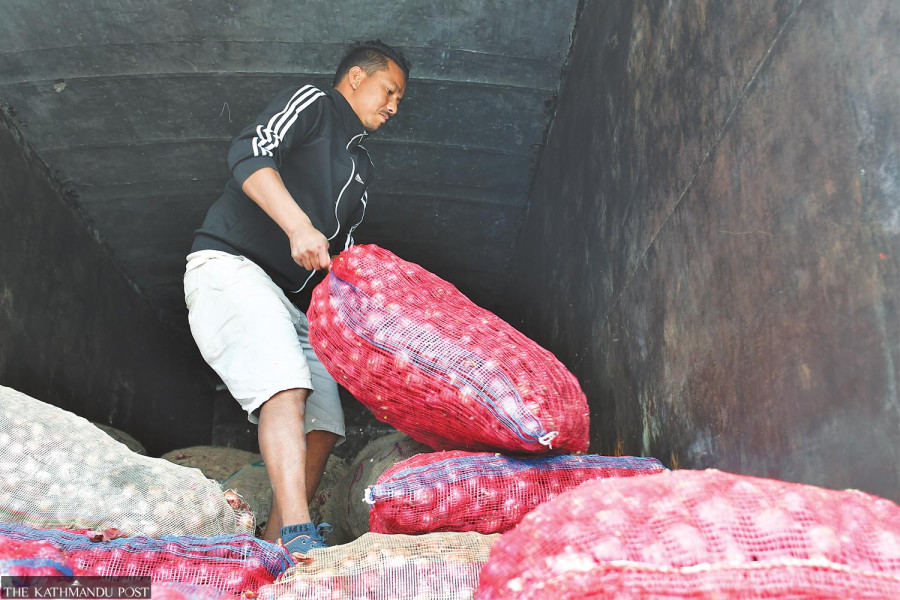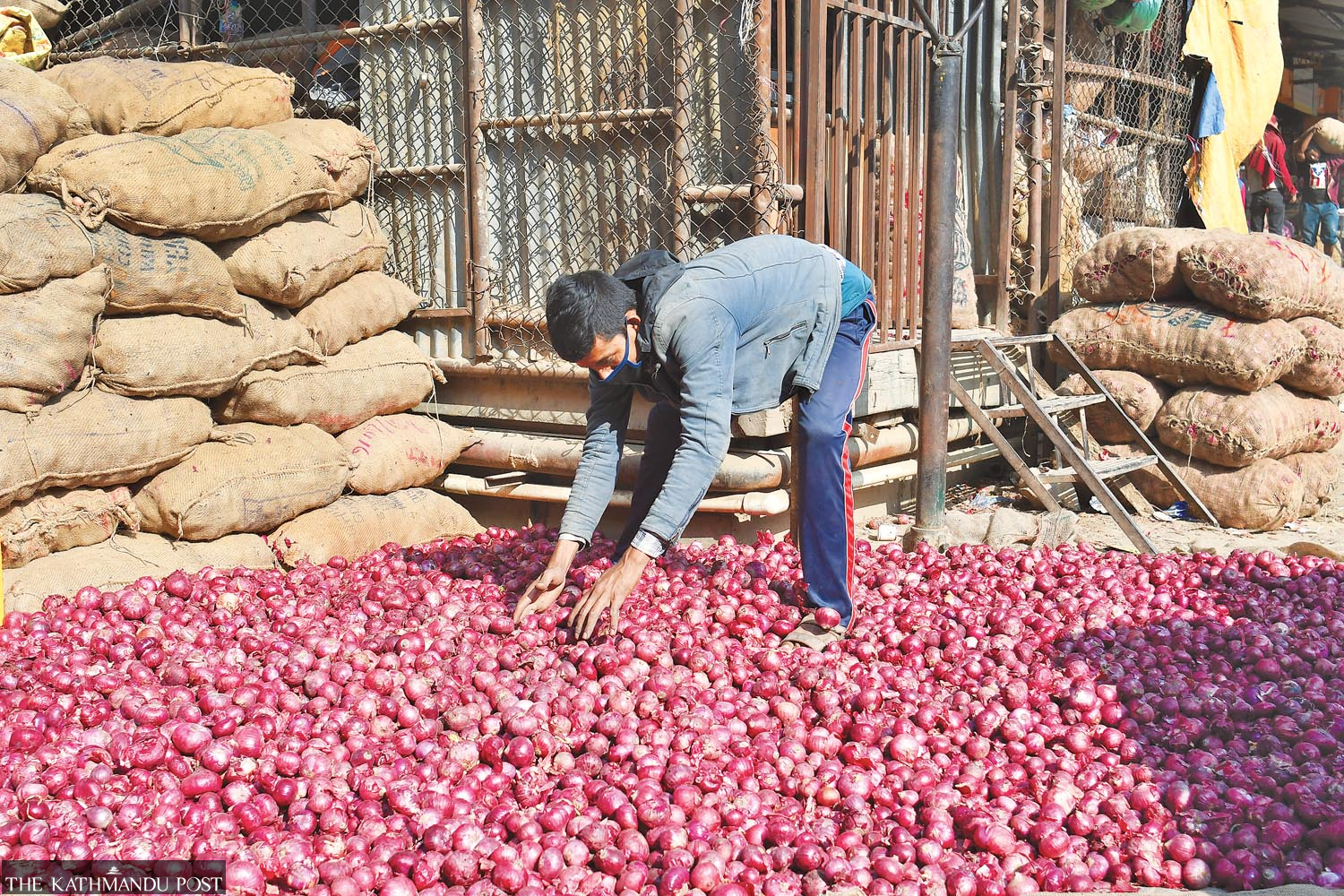Money
VAT makes the poor food insecure, say experts
Nepal relies heavily on imported onions and is gradually becoming a net importer of potatoes.
Pawan Pandey
Speaking at the budgetary discussion in Parliament, lawmakers criticised the government for imposing value-added tax (VAT) on food and making it dearer when inflation-stricken Nepalis were already having a hard time keeping the kitchen fires burning.
As per the financial bill, imported onions, potatoes and several other vegetables and fruits are subject to 13 percent VAT.
Finance Minister Prakash Sharan Mahat told lawmakers that the move was designed to protect local farmers by keeping imports out. He claimed that the general public would be largely untouched as VAT would be imposed only on the potatoes and onions sold at department stores.
“Most people who buy their groceries from such big stores are relatively rich, and the small vendors and their customers will not be affected by these provisions,” he said.
Members of Parliament and traders say the tax will make low-income families vulnerable to food insecurity.
They say that the finance minister's argument that the tax will promote local products is irrational as Nepal is almost totally dependent on imported onions and is gradually becoming a net importer of potatoes.
Nepal buys almost all its onion consumption from India as domestic production is negligible. The country imported 173,829 tonnes of onions worth Rs6 billion in the last fiscal year.
India is the world's biggest exporter of onions, a staple in South Asian cooking. Countries such as Bangladesh, Nepal, Malaysia and Sri Lanka all rely on Indian shipments.
The government has slapped 13 percent VAT on imported onions, potatoes, garlic, peas, frozen green leafy vegetables, collard greens, beans, spinach, sweet corn and other green vegetables.
Imported avocados, apples, quinces, apricot, cherries, strawberries, raspberries and cranberries, blueberries, kiwis and other fruits are also being taxed.
CPN-UML lawmaker Raghuji Pant told Parliament that not only have onions and potatoes become dearer after the budget, but also scarce.
“The price of onion which was Rs50 per kg before the budget has now crossed Rs100 per kg,” said Pant. “The price of potato has increased by 20 to 25 percent.”
The Nepal Agricultural Produce and Potato, Onion Import Export and Wholesalers Association on Monday criticised the government’s decision to impose 13 percent VAT on vegetables and fruits.
Mohan Baniya, president of the association, said that the price of potatoes and onions would increase by at least one-third because of the new tax.
“Traders will no longer be able to do business. The public too won’t be able to consume the pricey vegetables,” said Baniya.
Prakash Gajurel, general secretary of the association, said the government currently collects 9 percent agricultural service tax and 5 percent advance income tax.
“Adding 13 percent VAT on top of these taxes will make kitchen ingredients very expensive,” added Gajurel.
Lawmaker Juli Kumari Mahato said how appropriate is it to think that we will be self-reliant in onion and potato production overnight by increasing taxes when we don't grow any?
Traders at the Kalimati Fruit and Vegetable Market, Nepal’s largest vegetable and fruit marketplace, say they have not imported onions and potatoes since the government imposed VAT on them.
“It has been nearly a week since traders stopped importing onions and potatoes,” said Binay Shrestha, information officer at the Kalimati Fruit and Vegetable Market.
Prices of imported vegetables shot up immediately after the tax was imposed. The wholesale price of potato (red), which was Rs41 per kg, reached Rs45 per kg on Sunday.
“The current demand for potatoes is being fulfilled through local production," Shrestha said. But during the monsoon when most of the country’s fields are covered with freshly planted paddy, the country depends on imported potatoes.
Import trends show that the country’s output falls short of the requirement. According to agro experts, Nepal was self-sufficient in potato production until a few years ago, but imports have been rising of late.
Nepal imported 327,672 tonnes of potatoes worth Rs8.18 billion in the last fiscal year.
“When Nepali farmers are still dumping their unsold tomatoes and other vegetables on their fields, when will we get their prices to come down to pre-budget levels?” Pant questioned.
Responding to the questions of lawmakers, Finance Minister Mahat said that despite being a farming country, Nepal has been spending billions on food imports.
“Since we cannot impose high taxes because of the South Asian Free Trade Area (SAFTA), we decided to impose VAT on imports to provide a little help to domestic farmers.”
Nepal uses the Harmonized Tariff System for classification purposes. Import duty rates vary from zero to 80 percent.

There is a two-tier tariff rate system for most imported items—one for imports from South Asian Association for Regional Cooperation (Saarc) nations, which is usually lower than for imports from non-Saarc countries.
Machinery or goods related to basic needs or agricultural production are charged 5 percent or less in some cases. Products considered hazardous to one’s health, such as cigarettes, are taxed higher.
Responding to criticism by the tourism industry against the government's penchant for imposing taxes right and left, the finance minister said, “I don’t think people will stop visiting luxury hotels and resorts because of the rise in taxes”
Lawmakers said that as VAT has been imposed on domestic air travel, a ticket to Dhangadhi has become more expensive than a ticket to New Delhi, India.
Mahat said that a luxury tax has been imposed to protect domestic industry that adds value to imported goods. “India, too, has imposed a luxury tax.”
Parliamentarians also raised questions regarding the ambitious revenue collection target and reduction of the capital budget.
Mahat said that the economy had been suffering. “We cannot solve the issues in our economy at once, and we will have to address them step by step. While our debt liabilities have increased, we have not cut our liabilities for social security,” Mahat said.
Responding to lawmakers' allegations that the Finance Ministry had changed the tax rates to benefit businesses, Mahat refuted the charge saying that the tax rates had not been changed to benefit particular families, industrialists or entrepreneurs.
“We have not increased the rate but rationalised the tax rate. Changes were made by considering how they would help to make the economy vibrant by increasing revenue collection,” Mahat said.




 22.7°C Kathmandu
22.7°C Kathmandu















